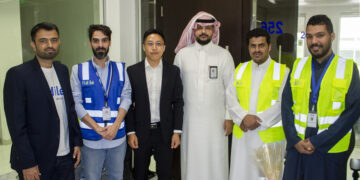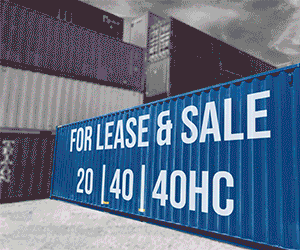Sustainability targets can only be achieved by decarbonising sea freight opines Amadou Diallo, CEO, DHL Global Forwarding, Middle East and Africa, who in this insightful contribution makes the case for sustainable shipping.

The maritime industry currently accounts for 2% to 3% of global carbon dioxide emissions according to S&P Global Platts Analytics, but some projections predict shipping could account for 17% of total annual carbon dioxide emissions by 2050.
A key component of global supply chains (ships carry more than 80% of global trade by volume), the international cargo and container shipping industry is making slow progress towards decarbonisation.
Maritime shipping is one of the few sectors excluded from the Paris Agreement on climate change. It continues to run on fossil fuels, also known as marine bunker fuels. Pressure is intensifying on the industry to contribute to the international goal of net-zero carbon emissions by 2050.
The International Maritime Organization is targeting a 50% cut in emissions from the global fleet by 2050 compared with 2008 levels. If business continues as usual, emissions will double by 2050 as the demand for freight shipping is expected to grow threefold over this period.
Net zero emissions
Meanwhile, countries in the Middle East have started making net-zero emissions pledges, starting with the UAE’s 2050 target and followed by Saudi Arabia and Bahrain in 2060. These sustainability ambitions are well aligned with national initiatives across the GCC that are driving the renewables agenda; as seen in the prioritization of sustainability by the UAE Green Agenda 2015-2030 and Vision 2021, Saudi Arabia’s Vision 2030 and Kuwait’s Vision 2035.
In 2018, only 0.2% of the US$ 269mn in voluntary carbon offset investments went to transportation. The vast majority of these funds was invested in forestry, renewable energy, and other offsetting projects. These projects are certainly beneficial, but they do not reduce greenhouse gases emitted by the transport sector itself, nor co-pollutants like black carbon, ozone, and nitrogen oxides.
What is more, offsetting outside the sector reduces the incentive to innovate and advance carbon neutral freight solutions. It is time for a paradigm shift – an innovative approach to drive higher investment into greener technologies and strategies in the logistics industry. Carbon ‘insetting’ offers a promising new pathway to freight decarbonization.
While offsetting is super easy and comparably cheap, it is not accepted as a means to reduce carbon dioxide emission. Companies that have signed up to the science-based target, or are in the process, need sustainable fuel solutions to meet their targets.
Sustainable marine fuel
The sustainable marine fuel in question is biofuel, something which comes in many forms, and whose environmental credentials differ depending on their source.
When selecting sustainable marine fuels, care should be taken to ensure that they are produced with sustainable feedstock and do not conflict with other sustainability requirements, such as food production. Waste-based biofuels must meet the requirements to be considered the cleanest biofuels currently available on the market according to strict sustainability standards.
Already today, carbon dioxide neutralization for FCL and LCL shipments can be achieved by using maritime biofuels. Core of this approach initially developed by the Good Shipping Programme is that the heavy oil that would ordinarily be used is replaced with sustainable marine biofuel on board preselected container vessels.
Of course, the renewable fuels are benchmarked against key criteria, to ensure that they are produced sustainably and do not compete with other needs, for example with food production for land use.
Sustainable marine fuel is vital to decarbonise ocean freight trade lines. From January 1, 2021, DHL started neutralizing the carbon emissions of all less-than-container load (LCL) ocean freight shipments.
Ocean freight demand
Aligned with the strong demand for ocean freight in the Middle East and Africa, DHL customers can choose sustainable biofuels to reduce their carbon footprint. Such was the success of the LCL initiative, DHL extended the service out to full-container load (FCL) shipments as well.
At the end of the year, DHL’s customers receive a verified certificate showing exactly how much carbon dioxide was reduced on their behalf which they can then take to their own auditors to really deduct it from their carbon footprint.
Decarbonization of transport
In the long-term, greater decarbonization of transport is key to driving positive change. Future-proofed logistics companies should think now about developing a stringent insetting strategy.
When paving the way towards greener logistics, collaboration across the industry is needed. By jointly developing methods and guidelines for carbon insetting and reporting, we can create a framework which makes it possible to allocate funds to decarbonization projects in the logistics industry. This would give the industry the opportunity to unlock a vital resource and significant leverage to support the technological shift towards truly decarbonized logistics.
Want to stay updated on the latest industry news and trends? Subscribe today to receive your monthly news highlights directly in your inbox!











